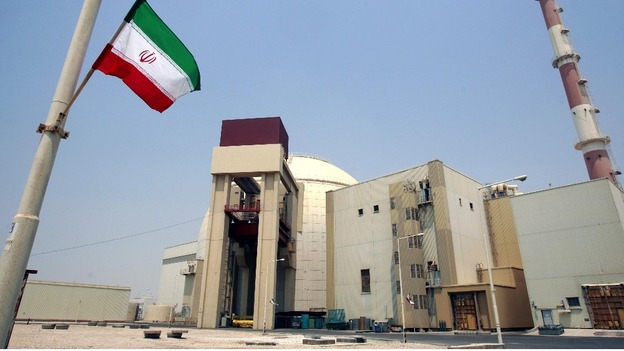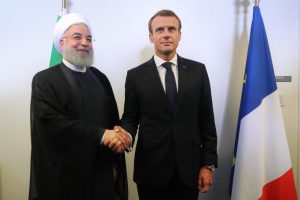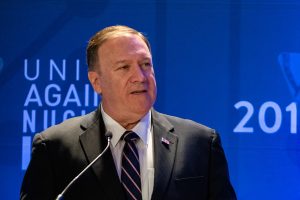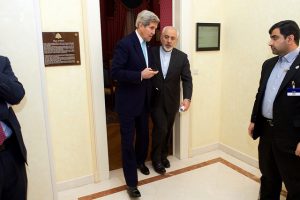by Eli Clifton*
The Wall Street Journal’s opinion pages have long served as a welcoming home to pundits toeing a hawkish line on Iran, Iraq and a laundry list of foreign policy challenges facing the United States. Tuesday, the Journal’s editorial board exclusively published details of a report provided by the Mujahedin-e Khalq (MEK), an exiled Iranian opposition group that until less than two years ago was designated a terrorist group in the United States and Canada.
Noticeably, the WSJ did not claim to have verified the MEK’s allegations that Tehran has continued to pursue nuclear weaponization research.
Even while uncritically reporting on the allegations, the article contained one major factual error. It read:
…having ceded a right to enrich and permitted the Islamic Republic to develop an advanced enrichment capability, the West is now left with preventing weaponization as the final barrier against a nuclear-capable Iran…
In fact, no administration or international negotiating body has “ceded” Iran the “right to enrich.” Iran has enriched uranium for the better part of the last decade despite sanctions from the past two administrations and demands that they cease enrichment. Even in the recent flurry of diplomacy between the P5+1 and Iran, no agreement has been made public and nothing has been formally conceded. (A November accord accepted de-facto enrichment while limiting Iran’s enrichment from 20 percent down to 5 percent.)
But perhaps more surprisingly, the WSJ editorial board apparently felt no compunction to inform readers about the source of this “plausible new report.” This, despite the fact that the Journal’s editorial team even includes one outspoken critic of the MEK, Sohrab Ahmari, an editorial page writer based in Europe.
In a 2011 Radio Free Europe column, Ahmari characterized the MEK as “a mostly irrelevant group as ideologically coherent as Lyndon Larouche’s cult and just as ineffective.” Later that same year, Ahmari, writing in Tablet, warned that the MEK was an “Islamo-Marxist cult.” Many critics have pointed to the group’s cult-like features, though over the last the few decades the MEK shed its Islamo-Marxist roots—a past many adherents today deny entirely.
On Tuesday and Wednesday, Ahmari, along with a small group of neoconservative pundits, promoted the article on Twitter but Ahmari, even while defending the MEK report, admitted the source was “problematic” in a tweet directed at me.
.@Ali_Gharib @EliClifton Because problematic sources can never disclose important, useful and newsworthy info, right? #Natanz #Arak
— Sohrab Ahmari (@SohrabAhmari) May 27, 2014
Indeed, the MEK has proven an unreliable source in the past.
In 2010, following an MEK claim to have discovered a secret nuclear site near the Iranian city of Qazvin, State Department spokesperson PJ Crowley told Fox News, “The MEK has made pronouncements about Iranian facilities in the past — some accurate, some not.”
While the Journal’s standards may be different for editorial content, a simple warning that the source was “problematic” and that much of the report was unverified, would be a reasonable expectation from one of the world’s most widely read newspapers.
“The MEK has a mixed record,” Daryl Kimball, executive director of the Arms Control Association, a Washington-based arms control advocacy group, told The Nation. “It’s curious that it occurred in the editorial page section and not the news section,” said Kimball. “The editors don’t appear to have tried to vet the information and they don’t stand behind it.”
The MEK may be onto something with its contention that Iran continued with its nuclear weapons work (the IAEA’s reporting about the “possible military dimensions” of Iran’s nuclear program only covers the period before 2003). But relying almost exclusively on the organization is, to borrow a word, problematic, and raises a question: Why did the MEK approach the ideologues of the Journal’s opinion pages instead of its newsroom staff with its exclusive report? Perhaps the paper’s veteran foreign affairs reporters, who have no doubt had many interactions with the MEK, are more skeptical of the group’s claim.
*This article was first published by The Nation on May 30 and was reprinted here with permission.
Copyright 2014, The Nation.






Washington Post continues to be a neocon propaganda machine, to an alarming extent. Defaming Iran is part of the programme.
P5+1 are willing to accept limited Iranian enrichment of uranium to low levels (less than 5%).
I had posted this on the Nation and it applies here as well:
And once again Eli Clifton strikes a blow for journalistic integrity. Of course he neglects to focus on the central issue involved with the WSJ editorial which is the fact that Iran has relentlessly pursued the development of a nuclear weapons infrastructure throughout the sanctions period. Substantial evidence has been uncovered from many sources besides the MEK, including the FBI, UN, Interpol, and the various intelligence services of many countries including the attempts to smuggle in nuclear weapons components, cyberhacking defense and academic databases for weapons information and enrichment techniques, acquisition of dual-purpose technologies that could be used for nuclear weapons, and so on.
In fact, even after the November accord to move forward with a timeline for negotiations, Iranian regime officials declared their intent to install an additional 30,000 next generation centrifuges to greatly increase their capacity to refine and enrich uranium into weapons grade material much more quickly than the 19,000 centrifuges it already operates. Hence, invalidating earlier moves to reduce their enriched stockpile.
Even more disturbingly, Iran’s Supreme Leader Khamenei made clear his nation’s intent to move forward with nuclear weapons research and stay committed to its jihad against the U.S. Normally this might be considered silly rhetoric from an old man, but this old codger happens to have all foreign policy decisions vested in him solely by the Iranian constitution.
Lastly, during Hassan Rouhani’s administration, Iran has gone on a bender of human rights violations, ranging from the inane such as the recent court order to Mark Zuckerberg and sentencing to 20 years in prison for people posting comments on Facebook to over 700 executions of political dissidents, women and even children, most in grisly public hangings. Coupled with recent support of Assad in Syria despite proof of chemical weapons use and the effort by the Iranian Revolutionary Guard to recruit Afghan refugees for $500 to fight in Syria, we get a pretty good idea of just how kooky and dangerous Iran’s behavior has been during these nuclear negotiations.
The latest chapter revealed only the other day was the revealing of the Iranian Revolutionary Guard’s Cyber Unit’s operation of a fake news site in order to befriend journalists, lawmakers and military personnel in the West on social media and then the implanting of malware in order to steal passwords and monitor keyboard strokes. I’m beginning to think Iran can teach the Chinese a thing or two about cyberattacks.
Now does Mr. Clifton deal with any of issues? Of course not. He’d rather spend his time trying to discredit a very small part of the Iran truth opposition in the MEK in the hopes no one will notice just how crazy Iran really is. The uncomfortable truth and fear for Mr. Clifton and other Iran regime defenders is that the West will eventually connect all these dots and realize a nuclear deal is not possible while this current government and governmental structure is in place. No Western nation can reasonably expect Iran to abide by an international agreement when the very basis of Iran’s government rests on the belief that divine interpretation is the way forward.
Now that might work for Pope Francis and the Vatican, but I certainly wouldn’t want the Swiss Guard to be nuclear capable and I certainly don’t want Iran to be either.
Here he/she goes again. Nothing like a smorgasbord too look at. The opposition to reaching a deal, just wont quit. Goodness, if all the money & effort went into providing relief for the Iranian peoples benefit, if you may, instead of the constant noise of pointing fingers at others, well, who knows, change just come in the form being sought by some. Of course, in any change, compromise is always part of the change. What isn’t heard from all the different voices on this subject, is what they propose besides changing of the guard. I certainly hope that these changers aren’t proposing to go back to the days of the “Shaw”, for his human rights are what brought the present regime to power.
Yup, it’s a smorgasbord because there’s just so much great stuff to talk about, which I notice you won’t touch. Hands up, are public hangings a bad thing? How about banning Facebook? Better yet, how about sentencing someone to 20 years in prison for posting on Facebook? Norman, it’s important to discuss the issues here because real people are really suffering. Look at Abedini. Nice guy. Christian pastor. Gets sentenced to prison and beaten on a pretty regularly basis because he passed out Bibles. And therein lies the difficulty for most of us in the West (notwithstanding your efforts to try and ignore the obvious), Muslim nations that have adapted and settled into good relationships recognize the need to hold to international standards of normative behavior, i.e. Indonesia, UAE, etc. Iran has steadfastly refused to do so in order to cling to a brand of totalitarian society more akin to Cuba and North Korea, hence its long time pariah status. So if you want to do some good out there, let’s find common ground for Iran to change a few things in order to bring them back to a civilized society that can work, live and play nice with others without the bloodshed, i.e. let’s try to act like a grown up Norman!
To C.I.N., adding the human rights and the various other items to the present Nuclear talks, as a precondition. As for discussing the issues here in this blog, I believe that everyone who reads this blog, is aware of the issues you state, though they seem to be mentioned by the same people who would rather there not be any solution other than what they would like. Each to his/her own opinion, but we who comment here, are not the ones that matter, as well as not being privy to any of the negotiations ongoing. This doesn’t mean we don’t care, but not knowing, well.